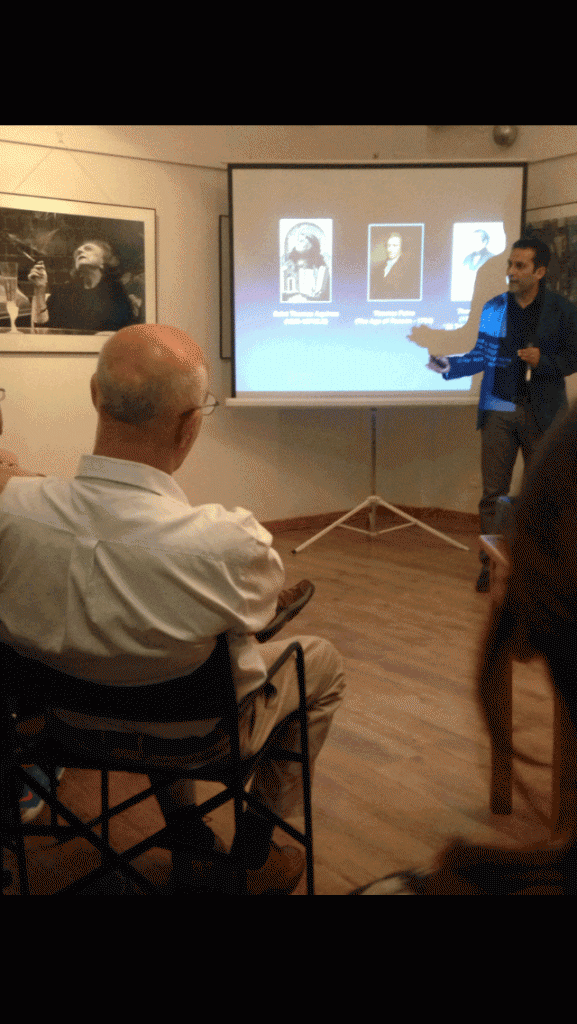Infinity and Beyond
“Somewhere, something incredible is waiting to be known.” ― Carl Sagan
The debate whether alien or intelligent life exists out there is not a recent one. Steven Spielberg’s 1982 movie release of E.T. the Extra-Terrestrial popularised the idea of aliens; Star Wars and Star Trek also further depicted the possibility that human beings could exist in another galaxy outside of this earth that we live on. In order to explore this topic, Salman Hameed delivered an interesting presentation at T2F last weekend. Coupled with questions and supporting facts from keen students, members of the LAS (Lahore Astronomers Society), as well as KAS (Karachi Astronomers Society) with other astronomers, physicists and lovers of science present in the audience, the talk was both engaging as well as insightful.
Hameed, a highly educated astronomer — initially from Karachi — but currently Charles Taylor Chair and Associate Professor of Integrated Science and Humanities in the School of Cognitive Science at Hampshire College in the US, provided a number of exciting facts and series of arguments regarding the cosmic universe and alien life. His talk covered theological, philosophical as well as scientific arguments for and against the notion and raised some thought-provoking questions.
One of the arguments he posits is that of the theologian Saint Thomas Aquinas. Aquinas aligns Christian beliefs with the possibility of alien life form by arguing that since God is infinite and is capable of anything, who are we to place a limit on what He can or cannot create? There could be other beings living out there created by God and the day He wills it, we may end up coming into contact with them. Likewise, Fakhruddin al Razi, a Muslim theologian also comments on Aristotle and rejects Aristotle’s theory of a single universe. Instead, Razi too argues for a multiverse, with reference to the Quran where we are told repeatedly that Allah is ‘Lord of all the Worlds,’ Razi emphasising on ‘worlds.’ Hence, Hameed provides us with theological and religious arguments for the existence of intelligent life beyond earth.
Further, Hameed also offers a scientific argument that we humans are made of elements such as oxygen, hydrogen etc. which are found in the universe. So, is it not possible that if we can be made of atoms containing these elements found on earth, so can other beings on other planets? The amino acids found on earth are found in comets as well, suggesting that these building blocks of life could be used in the creation of other beings too.
Similarly, another scientific argument was that of evolution — via natural selection the simplest of life forms can evolve into complex, thinking beings. Building on this argument, it could also be that the DNA structure could be altered to make more intelligent, rational beings. After all, as Hameed enlightens us, there are 3487 confirmed planets, 2611 planetary systems, 590 multiple planet systems and over 17 billion earth sized planets in the Milky Way. But most of all, there are other planets that have habitable zones, Mars being on the edge of them and also Kepler 62f and Kepler 62e. By habitable zones we mean where water can exist in liquid form, not freeze the way it would on Jupiter due to the cold temperature. Thus, scientifically speaking, there is a very strong possibility that intelligent life could exist outside of earth.
But one of the challenging questions raised by Hameed was, how exactly do we define intelligence? How do we define life? What are we supposed to do if we detect and confirm that there is extra-terrestrial life beyond earth? In response to the last question, some of the answers entailed Carl Sagan’s view that we should contact aliens, believing in their benevolent nature, and an exchange of information could take place. On the other hand, Stephen Hawking urges that we should not contact them because they would destroy us. Simply put, technologically inferior civilisations have ending up losing to the superior ones. It is the survival of the fittest and for us it would be a crushing defeat. And finally, anthropologists argue that we should not make false analogies – we cannot say anything about the sociology and culture of civilisations that we don’t share biology with.
But do we not share biology with them? As Hameed said, the elements found in us could be found in them too. Ultimately, he left it up to the audience to decide which side of the debate they are on. However, some could agree with his idea that: ‘infinite number of atoms, infinite number of possibilities.’ As for sceptics arguing that there is no concrete evidence of aliens existing, Schick and Toth said it best that, ‘absence of evidence is not evidence of absence.’
Note: For those wishing to delve further into this field, Hameed recommends two books: first, Childhood’s End by Arthur C. Clarke and second, The Sparrow by Mary Doria Russell (although he adds there is no need to read the sequel as it will destroy the first book!)




